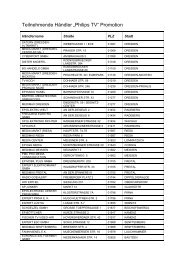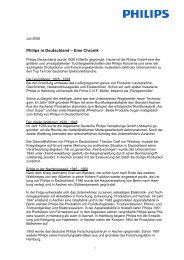Flying over Las Vegas - Philips
Flying over Las Vegas - Philips
Flying over Las Vegas - Philips
Create successful ePaper yourself
Turn your PDF publications into a flip-book with our unique Google optimized e-Paper software.
The Other Half<br />
We must not ignore the non-triad countries or, indeed, the poorer sections of the triad countries<br />
themselves. Much of the world’s population lives in p<strong>over</strong>ty, and daily life is devoted to satisfying very<br />
basic requirements on Maslow’s hierarchy of needs. In the developing countries, the consumer has<br />
yet to reach saturation point. Such countries still need to grow in quantitative and qualitative terms.<br />
Yet, as these countries endeavor to ‘catch up’, we must try to help them so that they learn from the<br />
mistakes that have been made in the triad countries. Somewhere along the way, the relationship between<br />
the consumer and the product has gone wrong. There is considerable disaffection with products that are<br />
<strong>over</strong>designed and <strong>over</strong>complicated. Short and wasteful life-cycles have just enlarged this sense of distance.<br />
The old ‘affection’ for products has been lost: instead, the dominant feeling is one of alienation. We must<br />
ensure that the same thing doesn’t happen in the non-triad countries. In the industrial triad, we must use<br />
available technology to restore the relationship between the consumer and the product. We must seek<br />
to create a design strategy which will improve the quality of life in both types of society.<br />
The Race against Time<br />
Modern times have been dominated by speed and acceleration. The implications have been enormous and<br />
diverse. The explosive problem of the environment, too, is largely a product of the amazing acceleration<br />
of time (and consequently also of the processes of production and consumption) that has taken place in<br />
recent history. This same acceleration of time is at the root of the cultural crisis our society is going<br />
through, as well as the cause of our increasingly superficial and banal relationship with objects.<br />
But from crises we can look to opportunities. We must therefore reconsider the value of time. We must<br />
go beyond the myth of velocity. The entire complex machine of production and consumption must be<br />
slowed down. We have to take time to enter into a relationship with people and things: time to do things<br />
carefully, considering the implications of our choices; time to think, to contemplate, to savor; time to give<br />
meaning to our lives and what we are doing. In opposition to this imp<strong>over</strong>ished and wasteful type of<br />
relationship with objects, let us propose a shift in objectives. We could suggest that we begin to work<br />
to achieve not, as before, a minimum of effort, but a maximum of quality. A quality of relationship that<br />
requires attention and care.<br />
10 11















